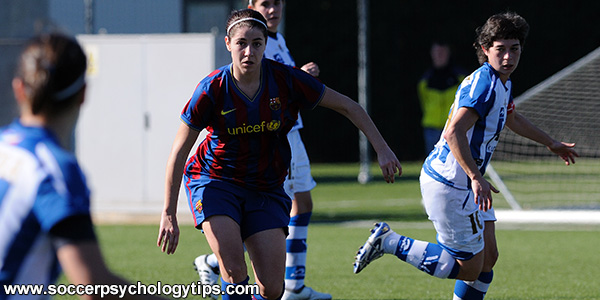
Can You Handle the Pressure of Big Soccer Games?
Is being nervous necessarily a bad thing?
Most soccer players would answer the previous question with a resounding, YES!
They also believe that nervousness guarantees a poor performance.
These players point to games where their play on the field suffered due to nervousness.
Is it really true, then, that nervousness guarantees a poor showing on the pitch?
The reality is that all soccer players get nervous…
That being the case, if nervousness was a bad thing, then no soccer player in the world would ever play a good game.
Well, we all know that is not true… So if nervousness is not the culprit for poor performance, then what exactly causes a player to have bad games?
Excessive nervousness not well managed is the guilty party for poor performance.
If you are not prepared and able to manage the stress of competition, it becomes difficult to play at your peak.
When it comes to nerves, there may be no more challenging game than when your team is competing for a national championship.
That is exactly the situation that Florida State University Women’s team found themselves in… competing for the National Championship against powerhouse University of North Carolina.
Florida State beat the defending NCAA Champion Stanford to advance to the finals but FSU still experienced nervousness as the team faced off against a UNC squad that had 21 national championships under their belt.
In the 60th minute, FSU took a 1-0 lead, leaving the team 30 minutes to protect the lead in order to take the title.
North Carolina pushed the pace in the final minutes trying to score a game-tying goal as the pressure mounted for Florida State. FSU senior midfielder Kaycie Tillman admitted to feel a heighted sense of nerves during the end of the game.
TILLMAN: “My heart was pounding. We were just trying to keep the lead, play as safe as possible and make sure we secure the win.”
FSU Senior midfielder Megan Connolly, a veteran on the team, also felt a high degree of nervousness as the team tried to close out the game.
CONNOLLY: “I couldn’t cope. Five minutes left and they were in our box? I couldn’t cope. But the team just fought through.”
Despite a heightened nervousness, FSU maintained its focus and thwarted every attempt to score by UNC to win its second National Championship, 1-0.
How?
How was a team who admittedly felt more nervousness than usual, still play its peak and win under such pressure?
The answer is that FSU relied on their experience and their ability to stay focused on the task at hand. This made their nervousness more manageable.
This is the reason that mental training is so important for athletes. Mental training helps athletes learn strategies to manage nerves, control emotions, and improve focus throughout the game.
How to Cope with Excessive Nervousness
First, use one physical strategy, such as focused breathing, to practice each day.
As you develop your breathing strategy, utilize that strategy in practices then apply it in game situations.
Second, learn how to focus on the process and not the outcome of the game.
Worry and anxiety makes you focus on the outcome of the game.
Related Sports Psychology Articles
- How to Anticipate and Cope During Soccer Games
- Self-Intimidation for Soccer Players
- Do You Embrace the Challenge or Panic Before Soccer Games?
- Subscribe to The Sports Psychology Podcast on iTunes
- Subscribe to The Sports Psychology Podcast on Spotify
Download a free sports psychology report to improve your mental game!
Learn more about our one-on-one mental game coaching.
Get the Mental Edge – With Mental Training

Do you perform well in practice, but find yourself under-performing in games? Do you doubt your skills and second-guess yourself under pressure? If so, mental training will help you reach your goals in soccer. Many soccer players have the skill but are held back by low confidence and lack of pregame mental preparation!
You can get expert mental coaching with us from anywhere. Meet with us via Zoom, Skype, FaceTime or phone call. With today’s video technology, we are able to connect with athletes and coaches all over the globe.
Call Us Today to Schedule Your Free 15-Minute Session.
Find Out How You Can Benefit From One-on-One Mental Coaching!
888-742-7225 | 407-909-1700

